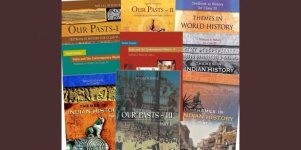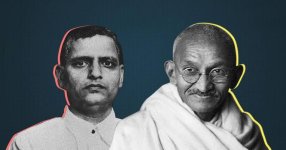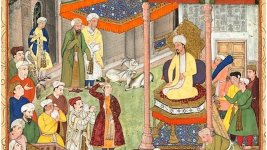In the past few years, a powerful question has sparked intense debate across India: Did India’s real history just get deleted? With recent curriculum revisions and textbook updates, students, educators, and historians are all asking what version of history is being taught—and more importantly, what is being left out.
From the removal of chapters on the Mughal Empire and Mahatma Gandhi’s assassination, to the rewording of key social movements and controversial reinterpretations of ancient texts, India's education system is undergoing a seismic shift.
These changes are more than academic tweaks; they reveal the political, ideological, and cultural undercurrents that shape how young Indians understand their nation.
The NCERT Revisions: What Changed?
The National Council of Educational Research and Training (NCERT), which designs India’s school curricula, has undertaken a series of textbook revisions since 2022. These revisions are part of a broader effort to align education with the New Education Policy (NEP) 2020. While the NEP promotes holistic and flexible learning, critics argue that the execution of its historical components appears biased.
Key deletions and alterations include:
Whose History Is Being Taught?
History is not just a record of the past. It is a mirror that reflects a nation’s identity, aspirations, and values. So, when parts of it are selectively deleted or rewritten, it alters how future generations perceive their culture and politics.
For example, the Mughal dynasty was a major political and cultural force in Indian history. From architecture and literature to administration and diplomacy, the Mughals left an indelible mark on the subcontinent. Their removal from textbooks not only distorts historical continuity but also suggests a discomfort with acknowledging India’s pluralistic past.
Likewise, the rewording or deletion of sections on Gandhi's assassination softens the harsh reality of communal violence and the dangers of extremist ideologies—key lessons in a diverse democracy like India.
Education or Indoctrination?
The concern isn’t just about what is being removed, but also what is being added or emphasized. There are increasing references to Hindu scriptures, mythological heroes, and Vedic science, often without a critical or evidence-based approach. While celebrating India's ancient heritage is valuable, doing so at the cost of ignoring other cultural influences risks turning education into a tool of ideology.
Several historians, including Romila Thapar and Irfan Habib, have expressed alarm over the trend. They argue that history should be complex, inclusive, and critical—not reduced to a simplistic good vs. evil narrative.
Impact on Students
For the average student, over time, these changes shape how young Indians see themselves and others. If history is taught without acknowledging colonial exploitation, caste struggles, or the contributions of minority communities, students grow up with a skewed worldview.
In many schools, teachers are left confused, as textbook changes are often implemented with little training or explanation. Students preparing for competitive exams face additional stress, as syllabi keep shifting without clarity.
Moreover, the suppression of uncomfortable truths robs students of the ability to critically analyze the past. This doesn’t just impact academia—it weakens the democratic fabric by discouraging informed dialogue and dissent.
The Political Backdrop
It's important to understand that these changes don’t exist in a vacuum. They reflect the broader rise of Hindutva—an ideology that promotes a Hindu-first narrative of Indian identity. The ruling Bharatiya Janata Party (BJP) and affiliated groups like the Rashtriya Swayamsevak Sangh (RSS) have long criticized previous historical accounts as being biased toward leftist or secular viewpoints.
By reshaping the narrative to emphasize Hindu heritage and minimize Islamic, colonial, or critical voices, these groups aim to cultivate a national identity rooted in cultural pride and unity. However, critics argue that this comes at the cost of erasing complexity and diversity—two things that have always defined India.
Resistance and Response
Despite the sweeping changes, resistance is growing. Protests have been held by student unions, academic councils, and civil society groups. Petitions have been filed demanding a halt to textbook overhauls without academic consultation.
Digital platforms and social media influencers have also taken up the cause, explaining historical nuances to young audiences and encouraging them to question, explore, and learn beyond the classroom.
Independent initiatives like “India Unfiltered” and “History for All” are gaining traction by providing balanced, multilingual content on Indian history that isn't restricted by political or institutional bias.
What Can We Do?
If you’re a student, teacher, or just a curious citizen, here’s how you can engage meaningfully:
Final Thoughts
So, did India’s real history just get deleted? Not entirely. But parts of it have certainly been obscured, softened, or reinterpreted. As a democracy, it is crucial that India’s youth engage with history in all its complexity—not just to understand where we came from, but to shape where we are going.
History is not just about dates and wars. It’s about identity, justice, power, and truth. And deleting the past does not protect us from its pain—it only delays its return.
What are your thoughts on it? Do share in comments.
From the removal of chapters on the Mughal Empire and Mahatma Gandhi’s assassination, to the rewording of key social movements and controversial reinterpretations of ancient texts, India's education system is undergoing a seismic shift.
These changes are more than academic tweaks; they reveal the political, ideological, and cultural undercurrents that shape how young Indians understand their nation.
The NCERT Revisions: What Changed?
The National Council of Educational Research and Training (NCERT), which designs India’s school curricula, has undertaken a series of textbook revisions since 2022. These revisions are part of a broader effort to align education with the New Education Policy (NEP) 2020. While the NEP promotes holistic and flexible learning, critics argue that the execution of its historical components appears biased.
Key deletions and alterations include:
- Removal of the Mughal Empire's detailed chapters from Class 12 History textbooks.
- Toning down references to Nathuram Godse, the man who assassinated Mahatma Gandhi.
- Editing out mentions of riots, caste-based discrimination, and movements like the 2002 Gujarat riots or Dalit activism.
- Replacing terms like “Muslim rule” with more neutral or Hindu-centric narratives.
Whose History Is Being Taught?
History is not just a record of the past. It is a mirror that reflects a nation’s identity, aspirations, and values. So, when parts of it are selectively deleted or rewritten, it alters how future generations perceive their culture and politics.
For example, the Mughal dynasty was a major political and cultural force in Indian history. From architecture and literature to administration and diplomacy, the Mughals left an indelible mark on the subcontinent. Their removal from textbooks not only distorts historical continuity but also suggests a discomfort with acknowledging India’s pluralistic past.
Likewise, the rewording or deletion of sections on Gandhi's assassination softens the harsh reality of communal violence and the dangers of extremist ideologies—key lessons in a diverse democracy like India.
Education or Indoctrination?
The concern isn’t just about what is being removed, but also what is being added or emphasized. There are increasing references to Hindu scriptures, mythological heroes, and Vedic science, often without a critical or evidence-based approach. While celebrating India's ancient heritage is valuable, doing so at the cost of ignoring other cultural influences risks turning education into a tool of ideology.
Several historians, including Romila Thapar and Irfan Habib, have expressed alarm over the trend. They argue that history should be complex, inclusive, and critical—not reduced to a simplistic good vs. evil narrative.
Impact on Students
For the average student, over time, these changes shape how young Indians see themselves and others. If history is taught without acknowledging colonial exploitation, caste struggles, or the contributions of minority communities, students grow up with a skewed worldview.
In many schools, teachers are left confused, as textbook changes are often implemented with little training or explanation. Students preparing for competitive exams face additional stress, as syllabi keep shifting without clarity.
Moreover, the suppression of uncomfortable truths robs students of the ability to critically analyze the past. This doesn’t just impact academia—it weakens the democratic fabric by discouraging informed dialogue and dissent.
The Political Backdrop
It's important to understand that these changes don’t exist in a vacuum. They reflect the broader rise of Hindutva—an ideology that promotes a Hindu-first narrative of Indian identity. The ruling Bharatiya Janata Party (BJP) and affiliated groups like the Rashtriya Swayamsevak Sangh (RSS) have long criticized previous historical accounts as being biased toward leftist or secular viewpoints.
By reshaping the narrative to emphasize Hindu heritage and minimize Islamic, colonial, or critical voices, these groups aim to cultivate a national identity rooted in cultural pride and unity. However, critics argue that this comes at the cost of erasing complexity and diversity—two things that have always defined India.
Resistance and Response
Despite the sweeping changes, resistance is growing. Protests have been held by student unions, academic councils, and civil society groups. Petitions have been filed demanding a halt to textbook overhauls without academic consultation.
Digital platforms and social media influencers have also taken up the cause, explaining historical nuances to young audiences and encouraging them to question, explore, and learn beyond the classroom.
Independent initiatives like “India Unfiltered” and “History for All” are gaining traction by providing balanced, multilingual content on Indian history that isn't restricted by political or institutional bias.
What Can We Do?
If you’re a student, teacher, or just a curious citizen, here’s how you can engage meaningfully:
- Read multiple sources – Don’t rely solely on school books. Explore books by various historians to get a fuller picture.
- Ask questions – Critical thinking is the antidote to indoctrination.
- Join discussions – Be part of history clubs, podcasts, or online communities that explore real history.
- Support independent scholarship – Follow and share work by credible historians and fact-based educators.
Final Thoughts
So, did India’s real history just get deleted? Not entirely. But parts of it have certainly been obscured, softened, or reinterpreted. As a democracy, it is crucial that India’s youth engage with history in all its complexity—not just to understand where we came from, but to shape where we are going.
History is not just about dates and wars. It’s about identity, justice, power, and truth. And deleting the past does not protect us from its pain—it only delays its return.
What are your thoughts on it? Do share in comments.



